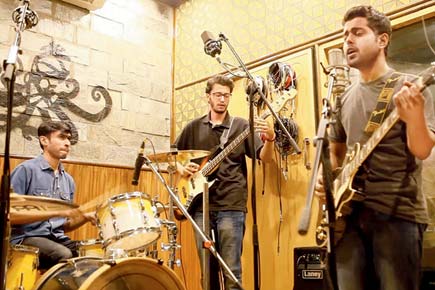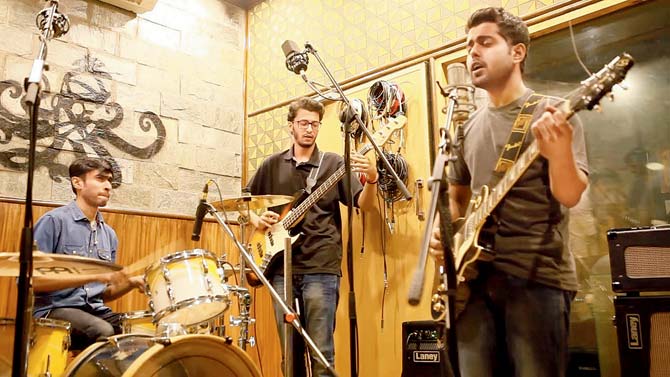The documentary Par Ek Din reveals the charms of pursuing a dream in Mumbai


Par Ek Din tells the story of the struggling days of the band City Haze
 Has it occurred to you, as it does to me so often, why so many outsiders who make it big in showbiz in Bombay inevitably have this heart-wrenching story to share about how, during their struggling days, they had to sleep the night on the pavement? I'm not saying they're all making it up. Just that over so many years of living in this city, and spending enough time being out at night, I've yet to find tall, dark, dapper, future versions of Amitabh Bachchan or Shah Rukh Khan sleeping on the streets!
Has it occurred to you, as it does to me so often, why so many outsiders who make it big in showbiz in Bombay inevitably have this heart-wrenching story to share about how, during their struggling days, they had to sleep the night on the pavement? I'm not saying they're all making it up. Just that over so many years of living in this city, and spending enough time being out at night, I've yet to find tall, dark, dapper, future versions of Amitabh Bachchan or Shah Rukh Khan sleeping on the streets!
ADVERTISEMENT
Be that as it may, as director Jaideep Verma puts it in his film Par Ek Din (that I just caught on YouTube right now), "Everybody tells stories about successful people, and romanticises their struggling days." He wanted to "tell a story about a band's struggling days, and romanticise their future."
For those unfamiliar with his stupendous work, if I'm not mistaken, Verma runs Impact Index, a Bangalore-based start-up that offers alternative statistical analyses to cricketing records. But as a very keen observer of Indian pop culture, he's perceptively handpicked some fine subjects to make documentary films on — Baavra Mann (2013; on filmmaker Sudhir Mishra), I Am Offended (2015; on the growing, urban stand-up comedy scene).
Par Ek Din is his fourth. The phenomenal Leaving Home — The Life And Music Of Indian Ocean (2010) was his first, watching which, a few college kids from Symbiosis, Pune, had been motivated enough to start a band of their own. These boys, who are 25 now, have moved to Mumbai. Spending their evenings catching WWE together, renting an apartment in Andheri, they make music during the day.
Is it a struggle? I'm sure. But they're upper middle-class enough to afford it. Their band is called City Haze. They've never performed live, or recorded an album. During the course of this film, they do — as Verma enters their private space to narrate their experience, rather than their journey.
What's so special about this film? Exactly what's special about Mumbai that attracts talents from across the country in disparate creative pursuits — writing, directing, acting, fashion, photography, music —
hoping to make a living of it, and along with it, adding so much to the city's charm.
This is something you inevitably notice on random evenings, walking in to after-hours' BYOB gigs in tiny or large apartments, stretching from Versova, Oshiwara, Goregaon, to Malad, Kandivli — minimal lighting in the room, people sitting on the floor, or piled up in the kitchen, someone playing guitar in the corner, and conversations that reek as much of dark rum as angst and hope.
It's almost the unpretentious college campus/dorm culture recreated among much older adults that can be addictive, awesome enough to turn many into perennial aspirants. While it doesn't sound like it from the outside — the 'struggle' can be a good life on its own.
City Haze is a Hindi rock band. In portions, they remind you of the Pakistani Fuzon, or Junoon. They seem to look up to Lucky Ali, and Indian Ocean, of course, while they continue to get inspired by all the new music they get acquainted with — whether Wilco or Van Morrison. Their songs are, as they call it, rather "gloomy." One of the bandmates suggests, if their music got even 10 per cent of the response that they expect, their songs would automatically become happier!
The lead singer-songwriter Samyak Singh is from Varanasi and Amethi in Uttar Pradesh. The lead guitarist Mallar Sen grew up in cosmopolitan Kolkata. Verma, in the film's voice-over, says, "It is interesting how these two distinct sensibilities drive this band's music: Samyak's small-town rootedness; and Mallar's big city, Western influences. This amalgam fundamentally gives this band its freshness, and its own voice."
They've been at it for a couple of years. The point, of course, is if they'll make it. Or perhaps that's precisely not the point at all. Success is so subjective. What's interesting about this experimental, DIY film is that it isn't inspirational in an obvious sort of way. Which is what 'success stories' are meant to be. Hence, pages after pages in popular journalism/writing are rightly devoted to shining the front-back-top light on those we look up to.
'Self-help' books, on how to get to the top, sell like hot vada pav. Yet, there's hardly a book in that section that supposedly teaches you to deal with failure, since that's more the foreseeable outcome in anything you pursue anyway (only one guy comes first, the rest don't). Failure is relative too.
Let's say, City Haze has disbanded already. Maybe these boys have found a day job by now. But you look at how they really were, enjoying the years they did, making the music they wanted to, and hopefully calling it a day with no regrets, whatsoever. There's so much pleasure in the process itself. I'd take that over that same old story of a man who came to Bombay with Rs 300 in his pocket, who went on to rule the world!
Mayank Shekhar attempts to make sense of mass culture. He tweets @mayankw14. Send your feedback to mailbag@mid-day.com
 Subscribe today by clicking the link and stay updated with the latest news!" Click here!
Subscribe today by clicking the link and stay updated with the latest news!" Click here!







